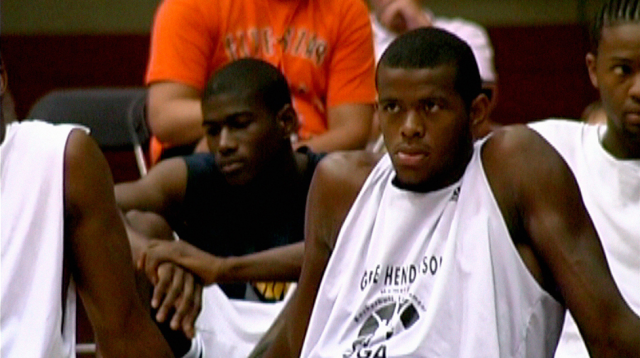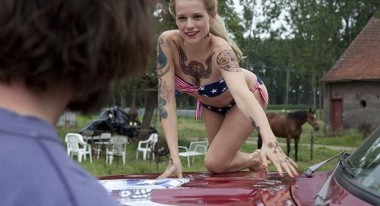 Back to selection
Back to selection
Tribeca 2013 Critic’s Notebook #3: On The Margins

It’s easy to feel cheated at film festivals, especially ones that charge $18 per ticket. (Does Tribeca still do that?) You couldn’t get into this screening or you missed that party or the awards because you couldn’t find a cab or had to file some copy. The publicist you have a crush on just isn’t that into you. Cry me a river. And then the awards have been given, the parties have been had, the distribution panel nameplates thrown in the trash. The clock is ticking, always, and you can never see or do everything. Funny, when you’re young, you try anyway, run yourself ragged, voice failing by the end from too many hard nights out in whatever town.
Fortunately for those who show up at these things to actually watch movies, there was a lot to like at this year’s Tribeca Film Festival, regardless of your sample size. (I’ve talked to people who’ve seen two or 10 or 25 or 60 movies this year, casual observers with dust-gathering film degrees and strident diehards covering for sales companies alike). Unlike many years past, it would be hard, though not impossible, to feel cheated.
The big winners in this year’s narrative competition — Kim Mourdant’s invigorating, crowd-pleasing Laotian drama Rocket, which took home the Best Narrative Feature and Best Actor prizes for its 10-year-old lead Sitthiphon Disamoe; and Felix Van Groeningen’s Dutch bluegrass melodrama The Broken Circle Breakdown, which won best screenplay for its director and Best Actress for the remarkable turn given by Veerle Baetens — are both the type of movies that have been Tribeca World Narrative Competition Winners in the past: elegantly made, accessible narratives from Europe and Asia that wouldn’t fit comfortably in a lot of programs found elsewhere in the city. They’re also both worth seeing. Not rigorous or auteurist enough for the Film Society’s NYFF or ND/NF, these are traditional, well-told stories that break little new ground.
The Rocket is the tale of a resourceful boy, seen as cursed by his often odious grandmother and born into the worst of personal and societal circumstances on the most bombed country on the earth, who ends up a refugee when a hydroelectric plant comes to town. It could have been a grim realist movie in the fashion of so many other rape-of/misery-with the Third World tales told by outsiders (last year’s Tribeca winner War Witch comes to mind, although that film had its fair share of lyricism). The Rocket has a buoyancy and humor during its opening, often tragic passages. These qualities are only enhanced as a drunk, James Brown-obsessed uncle appears, as does as a potentially redemptive rural rocket-building contest. The latter episode sets the stage for a movie that is overly mawkish, trying a bit hard to make you feel good, yet with a sensational lead performance by the young non-actor at its heart. By picture’s end, you feel its sentiments have been duly earned, for the most part.

Groeningen’s The Broken Circle Breakdown spares you no sentiment at all. It’s balls-to-the-wall emotion from start to finish, a movie that ends with a death bed singalong after weaving its way through a non-linear tale of grief and love and longing that will have many blinking at tears and a few scratching their heads. Who knew they have bluegrass bands in Holland? Editor Nico Luenen deserves as much credit as the cast — he spins this tale as if it’s The Sweet Hereafter on crystal meth, interweaving a decades worth of arguments, medical consultations and concerts in a densely packed narrative. The film touches on the brutality of cancer and drug addiction, the difficulties of commitment and the inability to stave of blame and recrimination with little subtlety but great skill, although the decisions to editorially forewarn us of the heartrending conclusion lessens its power once it arrives. The movie is an at times downright exhausting experience, but those songs are vivid and true.
One day, I’ll go to a film festival and the idea of showing an actual “film” will seem not quaint and arcane, as it mostly does now, but downright loony, like someone suggesting hopping a horse-drawn carriage to a house party a few neighborhoods away. Screening libraries at the savviest festivals have given way to online screening servers for any accredited individual to surf among the chrome tabs, so you don’t even have to bump into your programmer and critic friends near the water cooler at some hotel ballroom full of computers to see what’s on display. Surely a publicist would rather have your butt in a seat in a theater than on your couch while you pound a tall boy, but it’s not a necessity to them the way it used to be. But expecting to see the representation of a physical object made of celluloid by shooting light thrown at it? Get real.
The loss of this kind of physicality is the subject of Vivienne Roumani’s Out of Print, a thoughtful primer on the revolution known as E-books and online reading, and the way in which traditional reading and knowledge production, not to mention critical-thinking skills, are giving way to the cloud and mob rule by tweet. It’s by no means a groundbreaking film, and much of its reporting you can find in jeremiads in literary journals or trend pieces in The New York Times, but it retains interest throughout. B-roll of libraries and contemporary book production is interwoven with a brief history of, well, printing, before giving way to a parade of talking heads. Interviews with industry honchos of the old and new schools (yes, Jeff Bezos shows up), academics, best-selling authors (Scott Turow) and self-published upstarts of varying degrees of success are interesting, more so than the candid verite sequences involving young people and their actual interactions with written words, almost all of which are mediated by screens. How has the physiology of reading changed with the advent of these new technologies, let alone the economics of bookmaking? The film, narrated by Meryl Streep, asks these questions thoughtfully, allowing a variety of very smart people to speculate at length. But it’s far from a riveting viewing experience. Movies about writers almost never work; movies about the travails of their industry, as pertinent as they are to yours truly, are an even tougher sell.
On the final Saturday of the festival I finally ventured south of Canal Street to see a movie in the neighborhood that gives the thing it’s name, and it was a damn fine one. It’s the new picture by The Safdie Brothers, Benny and Josh, who have long been popular on these pages, and I’m happy to report that their first documentary, about the near forgotten high school basketball phenom turned undrafted afterthought, Lenny Cooke, is an emotionally stirring cautionary tale about the way in which the proximity and seeming inevitability of fame and prosperity tempt an underprivileged young man into making terrible choices for himself. Attending the same basketball camps for hyper-talented youngsters, Cooke came of age with contemporary NBA stars Carmelo Anthony and Lebron James and was thought to be an almost certain lottery pick in the year before 9/11. But costly choices (most notably leaving behind a wealthy white benefactor, the Northeast’s answer to that lady from The Blind Side, at a critical developmental stage), a questionable work ethic and poor advice from craven agents led him to both squander his eligibility for college ball and prematurely try to leap for the NBA after taking a season off from organized competition because of his age. Incorporating footage of Cooke shot during the year of his near superstardom, including candid moments between him and the NBA superstars to be, it is a harrowing look at the life of a young man who had the world at his fingertips and let it all slip away, a film that will stand with Hoop Dreams and Sugar as the best portraits of failed path to sports stardom.
What you realize after going to these things for awhile is that the best festivals give you more than what’s at the surface. The programs contain depth without feeling bloated. They make it hard for you to pick what to see. (It’s the opposite of what the best small festivals do; they make it easy.) The most interesting films at festivals the size of Tribeca usually take some digging. They’re usually not the movies with the “pound you with an email every six hours” publicists or friendly opening-weekend evening slots. Sometimes they are, which is always a relief, but the most significant stuff is usually found at the margins of the event, the aesthetically adventurous docs or genre-bending short no one remembered to tell you about.

I always catch Jon Gartenberg’s experimental shorts program at Tribeca because of this, and although it wasn’t as potent as in year’s past there were some true winners in Let There Be Light: The Cycles of Life, such as Jan Ijas’ slender and remarkable Two Islands, a five-minute Marker-esque film essay, complete with ethereal black-and-white photography and barely whispered voice over, about the world’s largest garbage dump and a cemetery for unknown persons, both isles just off of Manhattan. The film expertly raises terrible questions about our civilization’s priorities, showcasing two misbegotten places, forgotten totems of waste, which we conveniently keep out of sight, mainly to retain our vain belief that we live in a humane and sustainable society. Also in the program was Josh Gibson’s lovely Light Plate, a delicate Italian travelogue, also shot in shimmering black-and-white (hand processed by the director himself), that is part shadow play, part portrait of a pasta-maker’s labor. It’s a dream of a film, gentle and sure of itself, a beautiful, brief testament to the natural world and the traditions that help us tame it.
Among the other shorts I caught, noted cinematographer-turned-director Rodrigo Prieto’s Likeness, a formally wondrous, psychologically haunting short featuring Elle Fanning, a lot of gorgeous models and some pretty horrifying SFX makeup work, evocatively takes you inside the head of a girl battling the demons of distorted body image and bulimia. It’s hard to shake. Even more memorable was Emily Carmichael’s absolutely delightful RPG OKC which with arch humor and a style all its own ruminates on the internet-fueled romance between a pair of characters in separate electronic role-playing games. The film is animated in the style of 16-bit RPG games, but Carmichael’s writing is the real show here as it gives life to the anxieties of new infatuation and the passive aggressiveness implied therein between a Final Fantasy-esque knight and some kind of desert-dwelling cat. Worthy of repeated viewings, it grows more entertaining and relevant as its 10-minute running time wears on. Seek it, OK Cupid users and Facebook stalkers, I implore you.
